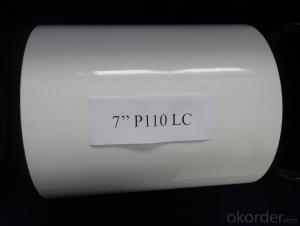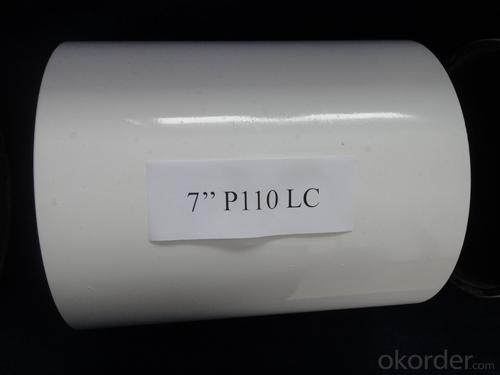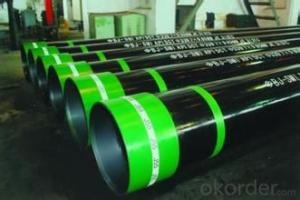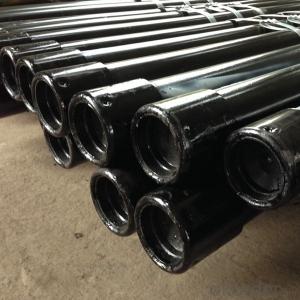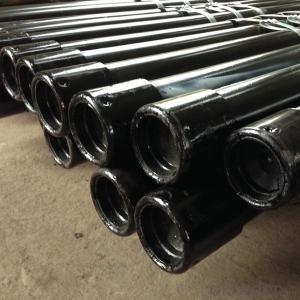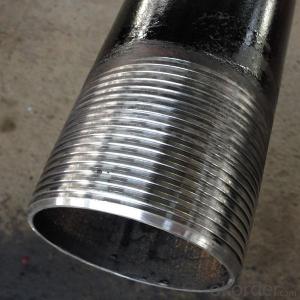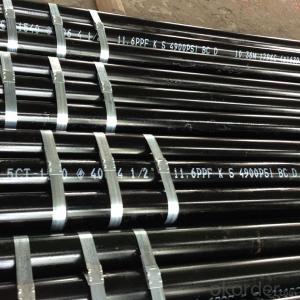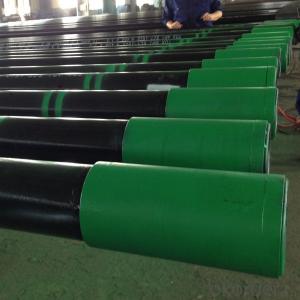K55 9 5/8" api 5ct seamless steel casing pipe
- Loading Port:
- Shanghai
- Payment Terms:
- TT OR LC
- Min Order Qty:
- 10 m.t.
- Supply Capability:
- 100000 m.t./month
OKorder Service Pledge
OKorder Financial Service
You Might Also Like
Oil Casing Pipe | |
Thickness | 1.24-60mm |
Out diameter | 10.3-1219.2mm |
Length | 6000-12000mm |
Standard | AISI, ASTM, BS, DIN, GB, JIS |
Material | A25,A,B,X42,X46,X52,X56,X60,X65,X70,X80 H40 J55 K 55 M65 N80 L 80 C 90 T 95 P110 Q125 CS-90 SCS-95 SCS-80 TCS-110T |
Application | used for natural gas and petrol |
Payment | TT ,L/C |
Packing | Standard seaworthy packing or as required |
Market | Mild east, North/South America, Europe, Asia,Africa etc |
Certificate | BV,SGS,MTC |
Delivery time | Within20-25 days after receive deposit or L/C at sight . |
We welcome you visit our factory!
- Q: How can the immersed pipe pile put steel cage into the steel pipe? Which expert to answer?
- Cast-in-place pile for pile machine in place, hammer (vibration), on the edge of immersed tube material, hammer (vibration) side of extubation, and continue pouring concrete, steel cage, continue pouring concrete and extubation to pile.
- Q: Can steel pipes be recycled?
- Yes, steel pipes can be recycled. Steel is a highly recyclable material and can be used to create new steel products, including pipes, through processes like melting and reshaping. This helps to conserve natural resources, reduce energy consumption, and minimize waste.
- Q: How do you prevent steel pipes from rusting?
- Various measures can be taken to prevent the rusting of steel pipes. One effective method is the application of a protective coating on the surface of the pipes. Different types of coatings, such as paint, epoxy, or zinc, can be used for this purpose. These coatings act as a barrier between the steel and the corrosive environment, thereby preventing direct contact between moisture, oxygen, and the metal, which can lead to rust formation. Another approach involves the use of corrosion inhibitors. These substances are added to the water or fluid flowing through the pipes, creating a protective film on the surface of the steel. This film acts as a shield, inhibiting the corrosion process and preventing the formation of rust. Regular maintenance plays a crucial role in preventing rust on steel pipes. It is essential to inspect the pipes regularly for any signs of damage or corrosion and promptly repair or replace any compromised areas. Additionally, keeping the pipes clean and dry by removing accumulated dirt or moisture helps prevent the formation of rust. In some cases, using stainless steel pipes instead of regular steel can be beneficial. Stainless steel contains chromium, which forms a passive oxide layer on the metal's surface. This layer acts as a natural barrier against corrosion, making stainless steel pipes highly resistant to rust. Finally, controlling the installation environment of the pipes can also help prevent rust. This can be achieved by maintaining proper ventilation, controlling humidity levels, and avoiding exposure to harsh chemicals or corrosive substances. By implementing these preventive measures, the lifespan and integrity of steel pipes can be significantly extended, while minimizing the risk of rust formation.
- Q: How are steel pipes used in water treatment plants?
- Steel pipes are commonly used in water treatment plants to transport and distribute water throughout the facility. They are used for various purposes, such as conveying raw water from the source to the treatment plant, distributing treated water to different areas, and carrying wastewater to the appropriate treatment processes. The durability and strength of steel pipes make them suitable for handling the high pressure and corrosive nature of water in these industrial settings.
- Q: What are the factors to consider when selecting steel pipes for a specific application?
- When selecting steel pipes for a specific application, several factors need to be considered. The key factors include the required strength and durability, corrosion resistance, temperature and pressure requirements, size and dimensions, cost considerations, and compatibility with other materials or systems. Additionally, factors such as the intended environment, installation requirements, and regulatory compliance should also be taken into account to ensure the optimal selection of steel pipes for the particular application.
- Q: How are steel pipes used in the construction of high-rise buildings?
- Steel pipes are commonly used in the construction of high-rise buildings for various purposes. They are primarily used as structural elements, forming the framework and supporting the weight of the building. Steel pipes provide strength and durability, making them suitable for withstanding the vertical and lateral loads experienced by tall buildings. Additionally, steel pipes are used for plumbing and electrical systems, as well as for heating, ventilation, and air conditioning (HVAC) installations. Their versatility, reliability, and ease of installation make steel pipes an essential component in the construction of high-rise buildings.
- Q: Which is better, galvanized steel pipe or stainless steel?
- Stainless steel is good.Stainless steel (Stainless Steel) is referred to as the stainless steel, the resistance of air, steam, water and other weak corrosive medium or with stainless steel known as stainless steel; while the resistance to chemical corrosion (acid, alkali and salt chemical etching) corrosion of steel called acid resistant steel. Because of the difference in the chemical composition of the two, and make their corrosion resistance is different, ordinary stainless steel is generally not resistant to chemical medium corrosion, and acid resistant steel are generally stainless steel.
- Q: What is the role of steel pipes in the chemical manufacturing industry?
- Steel pipes are an essential component in the chemical manufacturing industry as they are used for various purposes such as transporting chemicals, gases, and liquids safely and efficiently. They provide a durable and corrosion-resistant infrastructure, ensuring the integrity of the chemical processes. Steel pipes also play a crucial role in maintaining the overall safety and reliability of the manufacturing operations.
- Q: How are steel pipes stored and transported?
- Steel pipes are typically stored in warehouses or open yards, stacked in an organized manner to prevent damage. They are often transported using trucks or railcars, secured with straps or clamps to ensure stability. For long-distance transportation, pipes may be bundled together or loaded onto flatbed trailers. Additionally, protective coatings are applied to prevent corrosion during storage and transportation.
- Q: What are the standard dimensions and weight of steel pipes?
- The specific type and grade of steel pipes determine the variation in standard dimensions and weight. Nonetheless, the industry widely accepts some common standard dimensions and weight ranges. Seamless steel pipes typically have standard dimensions ranging from 1/8 inch to 60 inches in outer diameter (OD) and from 10.3 mm to 914.4 mm in wall thickness. The weight of seamless steel pipes varies depending on the size and length, ranging from a few kilograms to several metric tons. Similarly, welded steel pipes have standard dimensions ranging from 1/2 inch to 80 inches in OD and from 3.2 mm to 25.4 mm in wall thickness. The weight of welded steel pipes can also greatly vary, ranging from a few kilograms to several metric tons. It is worth noting that the dimensions and weight of steel pipes can be customized according to specific project requirements. Moreover, different countries or regions may have their own standards and specifications for steel pipes. Therefore, it is always advisable to consult the relevant standards and guidelines when determining the dimensions and weight of steel pipes for a particular application.
Send your message to us
K55 9 5/8" api 5ct seamless steel casing pipe
- Loading Port:
- Shanghai
- Payment Terms:
- TT OR LC
- Min Order Qty:
- 10 m.t.
- Supply Capability:
- 100000 m.t./month
OKorder Service Pledge
OKorder Financial Service
Similar products
Hot products
Hot Searches
Related keywords
